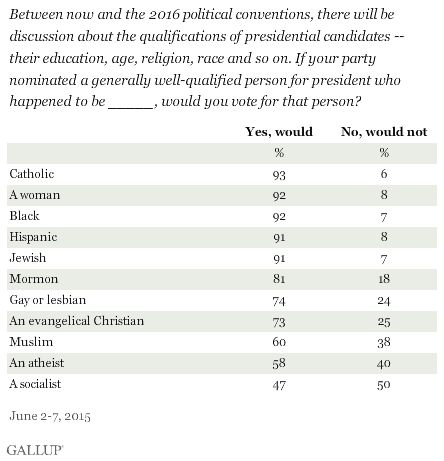Americans don’t think much of atheists.
According to a 2015 Gallup poll, 74% of Americans would vote for a qualified gay or lesbian for president. Sixty percent would vote for a Muslim. Only 58% would vote for an atheist. Forty percent would refuse to vote for an atheist.

Now I won’t even begin to claim atheists are more oppressed and marginalized than Muslims or gays in our society. They certainly are not. But I do think this is telling. We actually have a pretty snide and dismissive attitude toward atheists.
It is definitely not a popular thing to admit you are an atheist. If you do, even in progressive communities, you are often pegged as unfeeling, soulless, and without any sort of morality or purpose.
So most people don’t.
More and more, people who reject religion and “God” say they are agnostics or “spiritual” or simply avoid the question. To say you are an “atheist” would be to suggest that you are certain about something where certainty is impossible. Or it would mean that you think the universe is cold, sterile, and mechanistic. People want to feel the universe is full of wonder and spirit and atheists are a huge downer.
Oprah articulates this judgment perfectly:
Well, I’ve got news for you Oprah: You can be an atheist and be in awe. You can be an atheist and consider yourself spiritual.
You can even be an atheist and believe in God.
What exactly is theism?
Theism, according Dictionary.com is:
The form of the belief in one God as the transcendent creator and ruler of the universe that does not necessarily entail further belief in divine revelation.
According to PBS:
Theism states that the existence and continuance of the universe is owed to one supreme Being, who is distinct from Creation. For this reason, theism proclaims a dualistic relation between God and the world, wherein God is a being who controls events from outside of the human world.
Let’s notice two things about these definitions:
- Theism is the belief of God as a being separate from us and the universe.
- God is the ruler of the universe. “He” intervenes in and controls events on Earth. “He” has the power to change outcomes and circumstances. Things happen because God willed them that way.
Notice theism is very, very, very different than the “God is love”, “We are all God”, God is the universe idea of God that many of us have. It is saying specific things about how and why things happen and who made them happen.
A-theism (i.e. not theism) is simply not believing either one of the two statements listed above. That’s it.
Why I think you might be an atheist
My hunch is that under this definition most of us progressives would consider ourselves a-theists. We certainly don’t believe poor people are poor because God made it so. We don’t believe that when a plane crashes it’s because God wanted the passengers killed.
We believe that things are the way they are because humans have created systems that produce those outcomes.
Yet while we aren’t theists, we stop short of calling ourselves atheists. Somehow, we think being an atheist suggests something besides simply not being a theist. It suggests that we believe the world is completely mechanistic, that there’s no mystery to the world, that there’s no essence or life-force connecting us all.
I think this is an incorrect reading of atheism. All atheism is is not believing that events on Earth are caused by a divine being.
So you can consider yourself an atheist, but very much be open to the idea of “God” in the sense of many Eastern traditions – as the essence of the universe, a “oneness” and aliveness that we experience in meditation or other transcendent moments, or the sense of inherent connection we feel with other beings and the planet.
You can be an atheist and still be curious and open about a reality beyond what we can touch and feel.
Why it matters
With Kindling, I am primarily interesting in creating a new economy and society that is sustainable, equitable, and fulfilling for all. That’s why I’m doing this.
So why am I going on about God and atheism? Aren’t these completely unrelated? Why don’t I just let people believe in whatever they want, so long as they aren’t hurting anyone?
Well, as system thinking tell us, beliefs and mental models are the foundation of the systems and behaviors that we wish to change. If we want systems change, we have to understand and alter the mental models that those systems grow out from.
I care about these terms and these pervasive beliefs, because they affect our strategy for moving forward and tackling big problems. They affect what we consider effective approaches.
How often after a mass shooting or some other tragedy do we hear folks say they will pray for the victims?
While I appreciate your energy and kind thoughts, I’m sorry, but your responsibility cannot end there as you seem to suggest. We need to promote action on gun safety, mental health, corporate influence on politics, etc. Prayers and well wishes are helpful and welcome, but miles and miles and miles from being enough.
“God works in mysterious ways.”
No, again I’m sorry, but this latest tragedy – whether personal or societal – was not God’s will. It was not the purposeful plan of a supreme being. It was the tragic, unintended consequence of systems that we’ve created, that we are actively reinforcing, and that we have the ability to change.
Taking responsibility
When I say I’m an a-theist, it’s not a proclamation of the mechanistic nature of the universe. It’s not me saying I revere science above all else. It’s not a rejection of spirituality. In fact, I think spiritual practice and an appreciation of our oneness are essential to the kind of economy and society we want and need.
When I say I’m an a-theist, I’m rejecting the ¯_(ツ)_/¯ mentality many of us seem to have about what’s happening in our society. I’m rejecting the notion that we aren’t in control of our own society and these terrible tragedies that keep happening to us.
When I say I’m an a-theist, I am saying we created these tragedies and we can fix them.
I think it’s important to acknowledge that for much of human history, theism was the dominant worldview. This worldview led to some pretty unhelpful strategies for addressing our big problems. It’s important to declare that we now reject this worldview. We are looking for better approaches based in science, reason, and compassion. We are now taking responsibility for our actions and their consequences.
Maybe more importantly, it’s important that we acknowledge the amazing beauty and genius that we humans have created. It wasn’t God who scored that touchdown, man, it was you! It wasn’t God who sang that beautiful song, it was you!
That’s why it matters.
That’s why I’m an a-theist.



